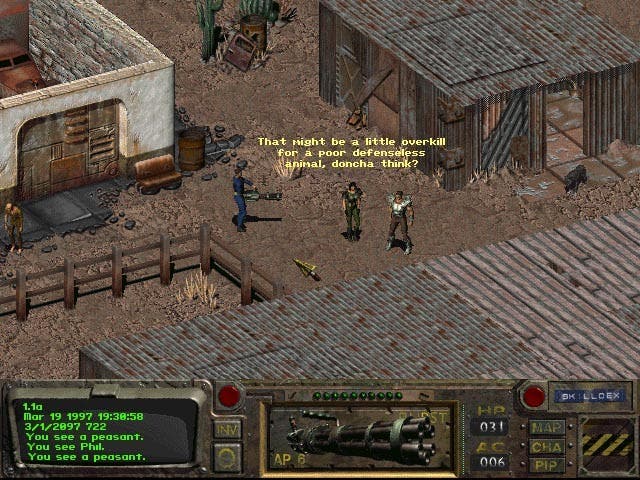Fallout Retrospective
How the original games caused a quiet revolution.
When Fallout 3 was announced, the widespread joy at the resurrection of a beloved and largely forgotten series by a developer of as much established talent as Bethesda was huge. But it was matched by an equally fierce backlash from one of the most notoriously fanatical, difficult-to-please fanbases in the gaming world. Most Fallout fans were adamant that the series ought to be left alone, that the limited technology that the games were built upon was an integral part of what Fallout was, and that any attempt to modernise the series could only result in the bastardisation of one of the most fondly-remembered game universes in the history of the medium.
Practically nobody bought the Fallout games. Lifetime sales in the UK, for instance, barely topped 50,000 units for the pair of them. Commercially, they were utterly disastrous. But if you can find one person who did play them and talks about them with anything other than near-rabid devotion, it'd be quite a feat. Few games inspire such passion, but embarking upon a search for its source, it's difficult to find anything that's not worth loving about Fallout. From the unrelentingly bleak, darkly ironic tone to the novelty of the open-world, post-apocalyptic setting, from the inspired, cerebral turn-based combat system to the immense degree of variety and personality in the character-customisation, the superbly-written quests and characters and the gallows humour that underpins the games without lessening their emotional impact, even the well-placed, gritty violence; there's very little about the games that doesn't command as much respect now as they did a decade ago.
The genesis of the series lies in Wasteland, a beloved post-apocalyptic adventure by Interplay, a developer already famous for Brian Fargo's The Bard's Tale trilogy, and released in 1988. Elements of Fallout's humour are evident in its colourful text descriptions ("Thug explodes like a blood sausage", "Rabbit is reduced to a thin red paste"), and the experimental open-world setting paved the way for Fargo and Black Isle Studios to develop a much more expansive, developed post-apocalyptic dystopia for Fallout, Wasteland's 'spiritual sequel', which was released almost a decade later in 1997. (Interestingly, Fargo has subsequently bought the Wasteland IP back from Electronic Arts and is working on a long-overdue sequel at his current developer, inXile. But that's another story.)

Fallout started life as a computer-game implementation of GURPS, a pen-and-paper role-playing system invented by Steve Jackson Games. Contract squabbles caused Interplay and SJG to part ways, but there is still much of the pen-and-paper RPG about Fallout. The open-world freedom and the extent of Fallout's character customisation both owe a lot to the game's original aim of emulating a tabletop RPG as closely as possible.
The SPECIAL character-creation system - Strength, Perception, Endurance, Charisma, Intelligence, Agility and Luck - in combination with a hugely varied selection of possible skills and character-defining Perks, ensured that it was possible to play Fallout in pretty much any way you could imagine. It was genuinely possible to create any character - a silver-tongued ladykiller, a meat-headed, giant-gun-toting thug, a sharpshooting scientist - and take them out of the safety of Vault 13, sealed from the inside since the onset of devastating nuclear war, and into the surrounding wilderness, and attempt to make it your own.








